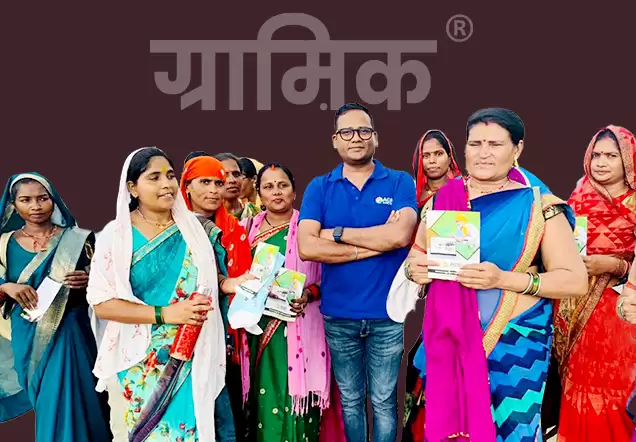How Gramik is addressing India's 15 Cr+ Farmers' problems with last-mile procurement

Raj Yadav, who is the son of a landless farmer from Jaunpur in Uttar Pradesh, grew up working in the fields to support his family and running a tea stall to support his parents' livelihood. He frequently traveled long distances with his father to purchase crop inputs, such as seeds, pesticides, and farm machinery as well as animal feed.
But Raj wanted to go to school and succeed for his parents, who he had seen working in the fields ever since he could remember. And that's what the main character in our tale did. Raj relocated from his village to pursue higher education with assistance from friends and family.
His career took off, and as he moved up the ladder, he found himself working for a few multinational corporations. Raj from Jaunpur, who was driven to make it even bigger, established the IT services firm 18Pixels, which put him on a more secure career path.
In an interview, Raj stated that it still seems like yesterday when he thinks back to his days working in the fields and traveling great distances with his father to buy farm supplies.
Even though times have changed, it's interesting to note that common Indian farmers are still seen traveling great distances in search of farm inputs, especially given the fact that millions of Indians now take advantage of at-home deliveries for just about everything, stated Yadav.
This was probably the straw that broke the camel's back, and an irate Yadav decided to take action to address the problem farmers have with obtaining farm inputs, particularly when they must travel great distances to find high-quality inputs.
During the height of the pandemic, Yadav then discussed his vision with an old friend named Gaurav Kumar. The two then discussed and worked out the specifics of how it would be carried out. This is how the intensely congested and cutthroat Indian agritech market gave birth to Gramik, formerly known as AgriJunction. One of the creators of Gramik is Kumar.

According to its website, Gramik, an agritech platform founded in 2021, strengthens and transforms rural communities through simple access to high-quality farm inputs, expert knowledge, cutting-edge farming techniques, and business skills for farmers, women, and rural youth.
The startup, which is still in its early stages, is supported by angel investors including MD Balram Singh of Godrej Agrovet, CEO Siddarth Gupta of Mercer Mettl, founder Richa Kar of Zivame, and NBFC Western Capital.
Gramik has largely bet on deeper penetration into the agri ecosystem, something he has learned from his past, and is focused on taking things one step at a time.
The agritech startup is proud of its dynamic tech stack, which places scalability at the centre. The startup also asserts that it will meet all of the agricultural needs of Indian farmers.
Operating in the market linkages sector, Gramik makes use of its relationships with suppliers and logistics companies to find products at lower costs and facilitate quick deliveries.
To Each Other's Rescue
Crop yields were poor, and traditional farming methods still kept Indian farmers in the stone age, according to Yadav, despite the government's extensive efforts over the years.
Although agritech startups have invested millions of dollars to improve supply chains, doubling farmers' income remains an unattainable goal. While the majority of agritech players are present at the block level, a farmer's last mile problems require stern management.
Gramik chose to simply contact farmers through its network of representatives, also known as Peer Partners, to resolve this. Yadav claimed he developed a partner model to reach more Indian villages that would have otherwise been dependent on government programmes and subsidies.
Farmers and startup are connected through the peer partner network. Gramik creates specialised offerings for local farmers based on data gathered from peer partners on the ground.
Before starting operations in a village, Gramik conducts a survey of the community, analyses opportunities related to crop patterns, irrigation options, and challenges involving the community's social and political structure. As a result, gramik recruits and trains peer partners in each village.
Women who are familiar with the region (villages) and its culture make up the majority of the peer network that Gramik establishes. According to Gramik, 90% of its peer partners are female.

Once the connection is made, the agritech platform targets just 20% of the village's residents and provides them with a one-stop shop for purchasing all farm-related products, including pesticides, seeds, machinery, and animal feed. The startup typically collaborates with 25 villages on a block or district level, which allows it to increase average order areas and provide quicker turnaround.
The startup is focused on effectively managing orders and enhancing operational efficiencies with peer partners running the show locally.
The platform currently has a network of more than 200 peer partners spread across Maharashtra and Uttar Pradesh. These partners collaborate closely with Gramik's block sales representatives, and they are compensated with commissions from monthly sales.
Additionally, the startup collaborates with government organizations like the National Seed Corporation and the Indian Council of Agricultural Research to host small workshops that encourage the adoption of cutting-edge farming techniques.
Agronomists employed by the startup also assist farmers in using scientific farming techniques to increase farm yield.
How Gramik's is Repairing the Supply Chain
On the supply side, the agritech startup directly sources goods from producers and distributors like Utkarsh Agrochem, Shrinath Seeds, and Geolife Agritech, including farm machinery, agrochemicals, pesticides, and bio-fertilizers.
Orders are then delivered to Gramik's warehouses, which are situated in state capitals. The inventory of the ordered goods is then transferred to micro-centers that are situated at block levels by its logistics partners. Finally, a neighborhood crew of drivers and transporters delivers the orders placed by its clients to the appropriate stations and villages.
Raj Yadav claims that the startup typically requires at least four days to complete an order. Peer partners make sure to contact potential farmers in between to record their needs and pass them along to Gramik's agents. This is done to guarantee efficient use of downtime and prompt delivery of input deliveries.
Gramik's tech stack, which automates and optimizes route mapping and navigation to ensure maximum coverage at lower costs, is what drives the entire system.
Gramik's tech stack has assisted in reducing its logistics costs from 14–15% when they first began in 2021 to about 7% today.
The startup sources its products directly from manufacturers to keep procurement costs down. This allows it to offer high-quality products to farmers while saving anywhere between 10 and 20% compared to the wholesale or retail route.
How does it handle returned deliveries and the farmers' cash flow problems?
The business uses a buy-now-pay-later (BNPL) model to give farmers quick loans that can be repaid in small amounts in addition to its zero credit policy.
Slow and steady wins the race.
Currently, the startup is operating in 2 districts in Maharashtra and 10 districts in Uttar Pradesh. The startup's philosophy has been to avoid explosive growth and focus on gradually and methodically growing its presence in the United States.
Whether in the millet markets of Buldhana in Maharashtra or the vegetable belt of Hardoi in Uttar Pradesh, the startup has remained committed to creating a strong network of peer partners in order to gain the trust of local farmers and then advance from there. In a year or two, it also intends to move into Madhya Pradesh.
The startup has benefited from the strategy, increasing its revenue by multiples since the second half of FY22.
Gramik reported INR 3.5 Cr in revenue for the period of October 2021 to March 2022. Since then, the business has expanded its operations and says it is almost ready to end the current fiscal year (FY23) with INR 80 Cr in revenue.
By the end of this fiscal year, Gramik also asserts that its gross merchandise volume (GMV) will exceed INR 100 Cr.
According to the startup, a large portion of its revenue comes from the sale of agrochemicals and biofertilizers, along with B2B commissions and the sale of goods to farmers through its marketplace.
Although Gramik currently burns between 8 and 10 lakh rupees per month in cash, its CEO claimed that this is well within control. He did admit, however, that the burn was a little higher than average because the company was gradually scaling back its growth plans.
Gramik has also focused on finding new sources of funding in the interim. Yadav asserted that the business is in negotiations with a number of investors to raise money and that a deal will probably be reached this year.
Since its founding, Gramik has raised INR 17 Cr in two funding rounds. The startup with its headquarters in Lucknow currently employs 75 people. It is important to remember that Gramik competes in the fiercely competitive agritech sector, which has recently given rise to a number of new-age tech startups.
A broken supply chain and market linkages continue to break the backs of many players, even though the majority are still confined to the output side of things. In addition, every significant player in agritech is sitting on growing losses and away from profits.
According to various industry reports, the domestic agritech market is predicted to grow to $34 billion by 2027. Local agritech players like DeHaat, CropIn, Waycool, Gramophone, and many others have been major contributors to this growth. These agritech startups use technology to connect with major B2B buyers directly, boost farmer income, and generate significant amounts of revenue.
Investors have taken note of the Indian startups' quick expansion. Between January 2014 and June 2022, Indian agritech startups raised nearly $2 billion in funding from VC and PE firms.
In India, where there are more than 1,000 startups, the agritech market is expected to reach $24 billion by 2025. Though the agritech industry does not currently appear to be doing well due to mounting losses and startups' mixed performance, it is important to note that India's agritech penetration is still below 5%, giving these players plenty of room to expand, scale, and succeed.

 Lalita Singh
Lalita Singh 





















